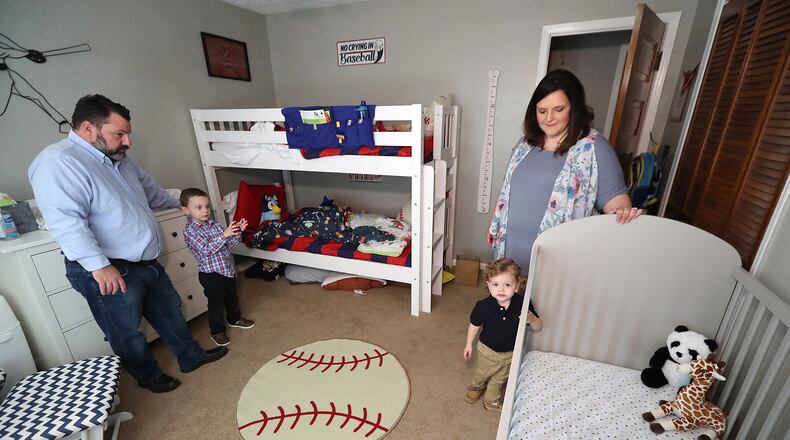After two years of legislative wrangling, Gov. Brian Kemp on Wednesday is expected to sign a bill that would give a quarter-million state employees paid parental leave benefits for the first time.
House Bill 146 grants three weeks of paid time off to workers following the birth, adoption or foster placement of a child.
The legislation, which passed the General Assembly in March with minimal dissent, is a milestone for Georgia, which has long ranked among the bottom of states in terms of providing family benefits. Until four years ago, many Georgia workers couldn’t use earned sick leave to care for an immediate family member.
“I think it’s an important step that’s going to help a lot of young families across our state,” said state Rep. Houston Gaines, the Athens Republican who sponsored the parental leave bill. His district includes portions of the University of Georgia, home to many professors and state employees who’d benefit from the measure.
But critics say the bill does not go far enough, especially after the pandemic illuminated discrepancies in the country’s child care system.
State Rep. Kim Schofield of Atlanta was one of eight Democrats to vote against the measure when it came before the House for final approval. She said parents need at least six weeks of paid leave to care for new children.
“We can’t continue to take baby steps when we need giant steps,” she said.
Currently, state employees qualify for 12 weeks of unpaid leave, the minimum required under the federal Family and Medical Leave Act. When Georgia workers give birth to or adopt a child, many must cobble together vacation days, short-term disability and other leave to take time off. For private sector workers, benefits differ by company.
The U.S. is an anomaly among the world’s 40 wealthiest nations in that respect. All others mandate at least some form of paid maternity leave, according to the Paris-based Organisation for Economic Co-operation and Development.
Paid family leave — a term that includes time off to care for a newborn child or sick relative — is available to 21% of workers nationwide, according to the latest federal Bureau of Labor Statistics figures. But that benefit is offered to only 5% of the lowest-paid workers, who often can’t afford to take time off or fear they’ll lose their jobs if they do.
Supporters say paid parental leave provides long-term benefits. Parents are given time to bond with their babies without having to worry about losing their jobs, and businesses get to worry less about turnover, they argue.
Opponents say such programs are costly for companies. They also contend that parental leave has been ineffective at bolstering women’s participation in the workforce and hasn’t led to higher wages for women because they stay on the job.
The politics around the issue have shifted drastically over the last five years. What was once seen as a Democratic cause has gained support among Republicans, especially after it was embraced by former President Donald Trump and his daughter Ivanka.
Recent polling suggests there’s a strong bipartisan consensus on parental leave in Georgia — though historically there have been disagreements about the scope and cost of such a program. A September 2020 survey from the Georgia Early Education Alliance for Ready Students, a nonprofit focused on boosting care and learning for children under 5, found that 9 in 10 voters in the state support paid family leave, including upward of 80% of Republicans.
Kemp’s action on the bill comes days after President Joe Biden proposed a sweeping federal program that would guarantee 12 weeks of paid time off for employees to care for a new child, sick relative or recover from a personal illness.
The plan, which Biden previewed during his address to Congress last week, would cost $225 billion over a decade. Once fully phased in, it would guarantee partial wage replacement of up to $4,000 a month, with a minimum of two-thirds of a worker’s average weekly wages.
Congress must weigh in on the proposal, and there’s a chance it could ultimately get eliminated or watered down.
In Georgia, advocates of parental leave are urging lawmakers to build on the momentum provided by HB 146.
The Georgia chapter of 9to5, a women’s workplace advocacy group, wants to double paid parental benefits for state employees to six weeks and approve a Colorado-style paid family medical leave insurance program. Under the latter, workers and employers pay into an insurance pool run by the state, and employees can then apply to receive money if they need to take time off.
Mica Whitfield, the group’s state director, acknowledged that an insurance program could be many years off for Georgia, where the statehouse is dominated by fiscal conservatives who are wary of imposing mandates on businesses. But 9to5 plans to “to keep the conversation going” with lawmakers, Whitfield said.
Gaines indicated he would like to wait and see before moving forward with other proposals.
“We just passed this. Let’s get this thing into law, see the impact it’ll have and then we can continue the conversation,” Gaines said. “For me, I think this is where we need to be, and it’s a significant step forward.”
Under the legislation, new mothers and fathers would become eligible for paid parental benefits after six months of full-time employment with the state. The measure, which would cover k-12 educators and University System of Georgia staffers, would not impact private companies.
About the Author
Keep Reading
The Latest
Featured





